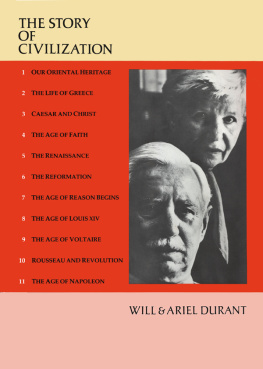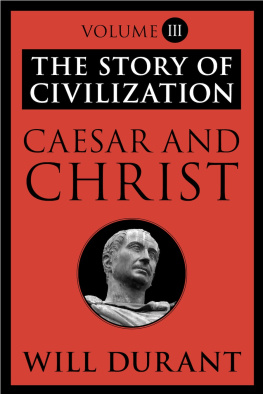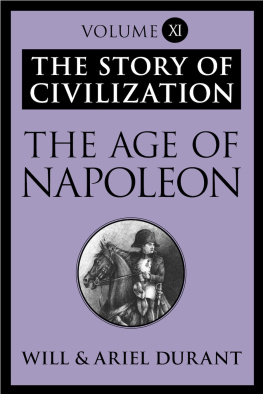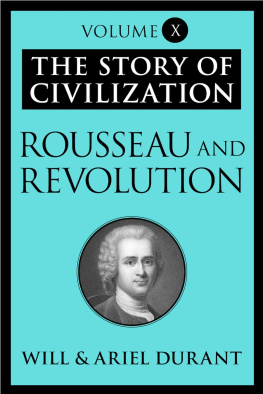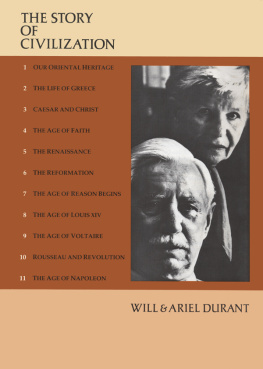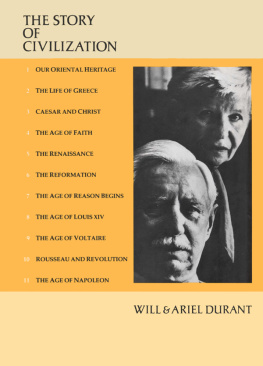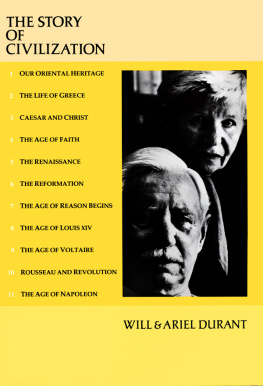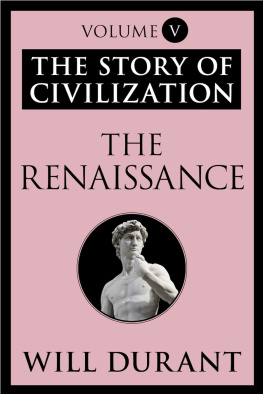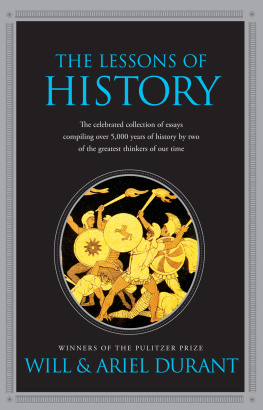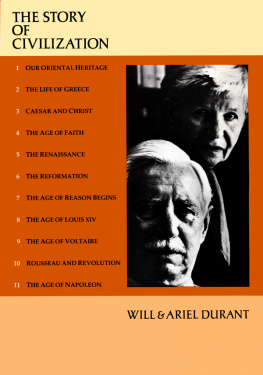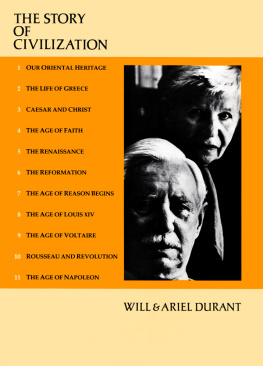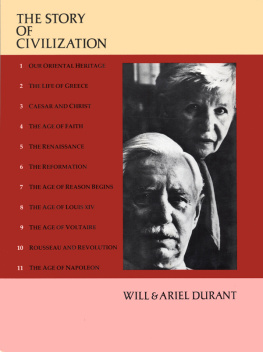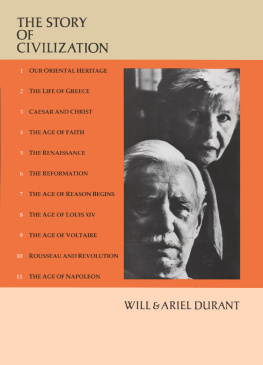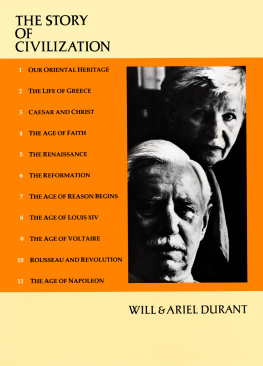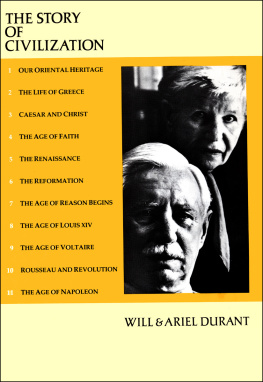About the Authors
WILL DURANT was born in North Adams, Massachusetts, on November 5, 1885. He was educated in the Catholic parochial schools there and in Kearny, New Jersey, and thereafter in St. Peters (Jesuit) College, Jersey City, New Jersey, and Columbia University. New York. For a summer he served as a cub reporter on the New York Journal, in 1907, but finding the work too strenuous for his temperament;, he settled down at Seton Hall College, South Orange, New Jersey, to teach Latin, French, English, and geometry (190711). He entered the seminary at Seton Hall in 1909, but withdrew in 1911 for reasons he has described in his book Transition. He passed from this quiet seminary to the most radical circles in New York, and became (191113) the teacher of the Ferrer Modern School, an experiment in libertarian education. In 1912 he toured Europe at the invitation and expense of Alden Freeman, who had befriended him and now undertook to broaden his borders.
Returning to the Ferrer School, he fell in love with one of his pupilswho had been born Ida Kaufman in Russia on May 10, 1898resigned his position, and married her (1913). For four years he took graduate work at Columbia University, specializing in biology under Morgan and Calkins and in philosophy under Wood-bridge and Dewey. He received the doctorate in philosophy in 1917, and taught philosophy at Columbia University for one year. In 1914, in a Presbyterian church in New York, he began those lectures on history, literature, and philosophy that, continuing twice weekly for thirteen years, provided the initial material for his later works.
The unexpected success of The Story of Philosophy (1926) enabled him to retire from teaching in 1927. Thenceforth, except for some incidental essays Mr. and Mrs. Durant gave nearly all their working hours (eight to fourteen daily) to The Story of Civilization. To better prepare themselves they toured Europe in 1927, went around the world in 1930 to study Egypt, the Near East, India, China, and Japan, and toured the globe again in 1932 to visit Japan, Manchuria, Siberia, Russia, and Poland. These travels provided the background for Our Oriental Heritage (1935) as the first volume in The Story of Civilization. Several further visits to Europe prepared for Volume 2, The Life of Greece (1939), and Volume 3, Caesar and Christ (1944). In 1948, six months in Turkey, Iraq, Iran, Egypt, and Europe provided perspective for Volume 4, The Age of Faith (1950). In 1951 Mr. and Mrs. Durant returned to Italy to add to a lifetime of gleanings for Volume 5, The Renaissance (1953); and in 1954 further studies in Italy, Switzerland, Germany, France, and England opened new vistas for Volume 6, The Reformation (1957).
Mrs. Durants share in the preparation of these volumes became more and more substantial with each year, until in the case of Volume 7, The Age of Reason Begins (1961), it was so great that justice required the union of both names on the title page. And so it was on The Age of Louis XIV (1963), The Age of Voltaire (1965), and Rousseau and Revolution (winner of the Pulitzer Prize in 1968).
The publication of Volume 11, The Age of Napoleon, in 1975 concluded five decades of achievement. Ariel Durant died on October 25, 1981, at the age of 83 Will Durant died 13 days later, on November 7, aged 96. Their last published work was A Dual Autobiography (1977).
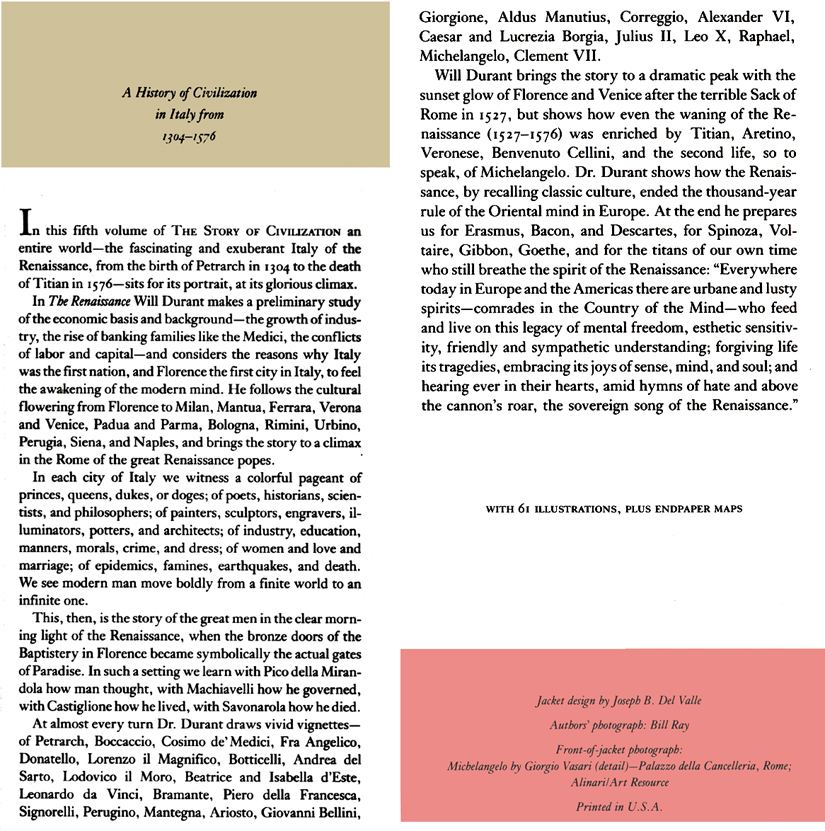
Bibliographical Guide
to editions referred to in the Notes
Books starred are recommended for further study
ABRAHAMS, ISRAEL, Jewish Life in the Middle Ages, Philadelphia, 1896.
ADAMS, BROOKS, The New Empire, New York, 1903.
ADDISON, JOSEPH, et al., The Spectator, New York, 1881, 8v.
ADDISON, JULIA D., Arts and Crafts in the Middle Ages, Boston, 1908.
ANDERSON, W. J., Architecture of the Renaissance in Italy, London, 1898.
ARETINO, PIETRO, Works: Dialogues, New York, 1926.
ARIOSTO, LODOVICO, Orlando furioso, Firenze, n.d.
ASCHAM, ROGER, The Scholemaster, London, 1863.
ASHLEY, W. J., Introduction to English Economic History and Theory, New York, 1894 and 1936, 2v.
*BACON, FRANCIS, Philosophical Works, ed. J. M. Robertson, London, 1905.
BAEDEKER, KARL, Northern Italy, London, 1913.
BALCARRES, LORD, Evolution of Italian Sculpture, London, 1909.
BANDELLO, MATTEO, Novels, tr. Payne, London, 1890, 6v.
*BARNES, H. E., History of Western Civilization, New York, 1935, 2v.
BASLER, E., Leonardo, Collection des matres, Braun, Paris, n.d.
BEARD, MIRIAM, History of the Business Man, New York, 1938.
BEAZLEY, C. R., The Dawn of Modern Geography, Oxford, 1906, 3V.
BERENSON, BERNARD, Florentine Painters of the Renaissance, New York, 1912.
BERENSON, BERNARD, North Italian Painters of the Renaissance, New York, 1927.
BERENSON, BERNARD, Study and Criticism of Italian Art, London, 190117, 3v.
BERENSON, BERNARD, Venetian Painters of the Renaissance, New York, 1897.
BEITF, CARLO, Cesare Borgia, Oxford University Press, 1942.
BOCCACCIO, GIOVANNI, Amorous Fiammetta, New York, 1931.
BOCCACCIO, GIOVANNI, Decameron, New York, n.d.
BOISSONNADE, P., Life and Work in Medieval Europe, New York, 1927.
BRINTON, SELWYN, The Gonzaga Lords of Mantua, London, 1927.
*BURCKHARDT, JACOB, The Civilization of the Renaissance in Italy, London, 1914.
CAMBRIDGE MEDIEVAL HISTORY, New York, 1924f, 8v.
CAMBRIDGE MODERN HISTORY, New York, 1907f, 12v.
CARDAN, JEROME, The Book of My Life (De vita propria liber), New York, 1930.
CARLYLE, R. W., History of Medieval Political Theory in the West, Edinburgh, 1928, 6v.
*CARTWRIGHT, JULIA, Beatrice dEste, London, 1928.
*CARTWRIGHT, JULIA, Isabella dEste, London, 1915, 2v.
*CARTWRIGHT, JULIA, Baldassare Castiglione, London, 1908.
*CASTIGLIONE, BALDASSARE, The Courtier, Everymans Library.
CASTIGLIONI, A., History of Medicine, New York, 1941.
*CELLINI, BENVENUTO, Autobiography, tr. J. A. Symonds, Garden City, New York, 1948.
*CHUBB, THOMAS C., Aretino, Scourge of Princes, New York, 1940.
COMMINES, PHILIPPE DE, Memoirs, London, 1900, 2v.
*CORNARO, L., Art of Living Long (De vita sobria), Milwaukee, 1903.
COULTON, G. G., The Black Death, New York, 1930.
COULTON, G. G., Five Centuries of Religion, Cambridge University Press, 1923f, 4v.
COULTON, G. G., From St. Francis to Dante, a tr. of the Chronicle of Salimbene, London, 1908.
COULTON, G. G., Inquisition and Liberty, London, 1938.
COULTON, G. G., Life in the Middle Ages, Cambridge University Press, 1930,4v.
COULTON, G. G., Medieval Panorama, New York, 1944.
*CRAVEN, THOMAS, Treasury of Art Masterpieces, revised ed., New York, 1952.
*CREIGHTON, MANDELL, History of the Papacy during the Reformation, London, 1882, 4v.
CROCE, BENEDETTO, Ariosto, Shakespeare, and Corneille, New York, 1920.
CROWE, J. A., and CAVALCASELLE, G. B., A New History of Painting in Italy, London, 1864, 3v.
CRUMP, C. G., and JACOB, E. F., The Legacy of the Middle Ages, Oxford, 1926.
DANTE, La commedia divina, ed. Paget Toynbee, London, 1900.
DILLON, EDWARD, Glass, New York, 1907.
DOPSCH, ALFONS, Economic and Social Foundations of European Civilization, New York, 1937.
DUHEM, P., tudes sur Lonard de Vinci: Ceux quil a lus et ceux qui lont lu, Paris, 1906f, 3v.
EINSTEIN, ALFRED, The Italian Madrigal, Princeton, 1949, 3v.
ELLIS, HAVELOCK, Studies in the Psychology of Sex, Philadelphia, 1911, 6v.

